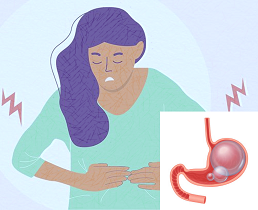Gas in the gut (also called flatulence) produces an uneasy sensation that includes the feeling of bloating, abdominal discomfort or cramps, a heavy full feeling with/without abdominal distension, and a desire to release air either from the mouth as a burp, or from the anus as flatus.
Some amount of gas in the gut is formed as a normal process of digestion. Increased gas formation occurs by eating certain kinds of foods and also by swallowing too much air while eating.
Diet and Lifestyle modification are the corner stones of therapy.
Symptomatic treatment of gas is done with the help of absorbing polymeric agents like simethicone and dimethicone.
Gas formation may be due to the following conditions, that may need individual management as described below.
GUT DYSBIOSIS
The balance of normal healthy bacteria (gut flora) is disturbed due to faulty lifestyle, processed and refined diet, long term use of medicines, alcohol, stress, and gut diseases. Bacteria like Bacteroides and Clostridium group produce increased amounts of gas, while gut bacteria like Lactobacillus and Bifidobacterium can help reduce and normalize gas formation.
Treatment is with probiotics that contain Lactobacillus and Bifidobacterium bacteria to help restore the balance of gut bacterial flora.
GUT INFECTION
A group of bacteria called coliforms (like E. coli) cause both acute and chronic gut infections and cause increased gas production.
Acute infections can occur when a large bacterial load is ingested through contaminated food (food poisoning or acute gastroenteritis). Such conditions present with nausea, vomiting, abdominal pain, diarrhea and flatulence. Often supportive care alone with soft diet, along with good hydration with water and salts/electrolytes helps in spontaneous recovery, but in severe cases, a course of antibiotics is given.
Chronic gut infection is also sometimes called small intestinal bacterial overgrowth (SIBO), in which the balance tilts towards coliform bacteria, reducing the population of friendly bacteria like Lactobacilli and Bifidobacteria. SIBO can be diagnosed by a breath test analyzing amounts of hydrogen/methane gas present. It is treated with a course of antibiotics, and long-term probiotics.
IBS
Irritable Bowel Syndrome is a condition characterized by abdominal pain/cramps with change in stool frequency and consistency (diarrhea or constipation type). It is often accompanied by gas. Antispasmodic drugs like mebeverine are available to manage abdominal pain. Constipation is managed by laxatives and/or agents called prokinetics that increase gut motility (like itopride, prucalopride). Diarrhea is managed with agents that relax the gut (antianxiety drugs like chlordiazepoxide) and the specific gut anti-infective rifaximin. Probiotics are also used as supportive treatment.
ACIDITY AND INDIGESTION (DYSPEPSIA)
Dyspepsia is characterized by a feeling of acidity (burning) and fullness (especially post-meal) in the upper central abdomen, along with gas.
The condition may be treated with acid suppressants sometimes in combination with prokinetics. Alkalizing salts that reduce acidity are available in combination with simethicone or dimethicone. Supplements of digestive enzymes like diastase-pepsin or pancreatic enzymes may be given. Sometimes antidepressant medicines may also provide some benefits.
FOOD ALLERGIES AND INTOLERANCE
These include conditions like lactose or gluten intolerance. There may be accompanying diarrhea or constipation. Lactose intolerance is treated with a diet free of milk/milk products, and with lactase enzyme supplement tablets. Gluten-sensitive enteropathy (coeliac disease) which is an autoimmune disease, and gluten intolerance (short-term bloating and abdominal pain on eating gluten) are both treated with gluten-free food products now readily available. Sometimes specific food allergies may be present that need to be omitted from diet.
Alarm symptoms needing medical attention:
- Blood in stools
- Change in frequency or consistency of stools (diarrhea/constipation)
- Weight loss
- Persistent or recurrent nausea or vomiting
- Pain or tenderness in a specific area of the abdomen
- Persistent abdominal pain
Note: Conditions of the heart like angina or heart attack may mimic acute gas formation, and thereby escape timely diagnosis. Be alert if there is chest pain, pain along the arms, jaw pain, breathlessness or any uneasiness/constricting feeling in the chest. It is better to take a medical opinion immediately in such cases.
Also read:
3 points of care for people with tendency for gas and bloating
Acidity, Gastro-Esophageal Reflux Disease (GERD), Dyspepsia (Indigestion) and Ulcers


